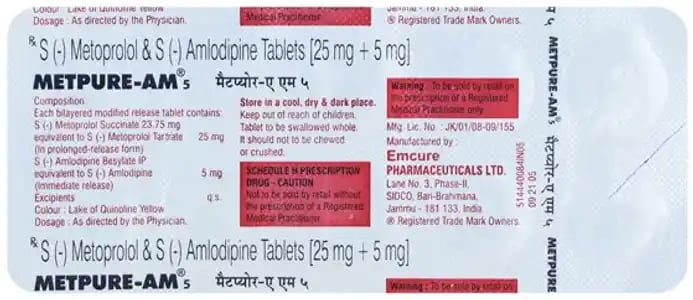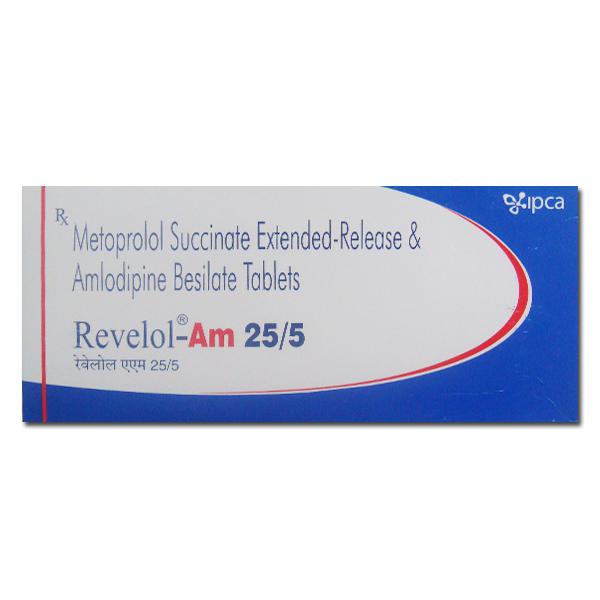amlogard Met AMLODIPINE + METOPROLOL SUCCINATE
Introduction to amlogard Met
Amlogard Met is a combination medication available in tablet form, primarily used to manage high blood pressure and angina. Amlogard Met combines the benefits of Amlodipine and Metoprolol succinate to effectively reduce the risk of cardiovascular events such as heart attacks and strokes.
Composition of amlogard Met
Amlogard Met contains two active ingredients: Amlodipine and Metoprolol succinate. Amlodipine is a calcium channel blocker that relaxes and widens blood vessels by preventing calcium from entering the cells of the heart and blood vessel walls. Metoprolol succinate is a beta-blocker that slows the heart rate and reduces the force of heart contractions, thereby lowering blood pressure and decreasing the heart's oxygen demand.
Uses of amlogard Met
- Treatment of high blood pressure (hypertension)
- Management of angina (chest pain)
- Improvement of survival after a heart attack
- Management of heart failure
Side effects of amlogard Met
- Common side effects: swelling of hands, feet, ankles, or lower legs; dizziness; flushing; tiredness; depression; nausea; diarrhea
- Serious side effects: severe bradycardia (very slow heart rate); hypotension (low blood pressure); worsening heart failure
Precautions of amlogard Met
Use Amlogard Met cautiously in patients with severe aortic stenosis or heart failure, as it can worsen these conditions. It is contraindicated in patients with severe bradycardia, heart block, or cardiogenic shock. Do not stop the medication abruptly to avoid worsening angina or heart attack. Patients with liver impairment should use Amlogard Met with caution and undergo regular monitoring.
How to Take amlogard Met
Amlogard Met is taken orally, usually starting at a low dose and adjusted based on individual response and tolerance. Follow your doctor's advice for the correct dosage and administration method.
Conclusion of amlogard Met
Amlogard Met, a combination of Amlodipine and Metoprolol succinate, belongs to the therapeutic class of antihypertensive and antianginal medications. It is manufactured to effectively manage high blood pressure, angina, and improve survival post-heart attack. Amlogard Met is a vital medication for reducing cardiovascular risks, and its usage should be guided by a healthcare professional.


Are the medicines in combination of Amlodipine and Metoprolol succinate safe to take together?
Amlodipine and Metoprolol succinate can be used together to manage hypertension and angina, but they may interact with other medications that affect blood pressure and heart rate. For instance, combining them with other antihypertensives or heart rate-lowering drugs can increase the risk of hypotension or bradycardia. Monitoring involves regular blood pressure and heart rate checks, and patients should report any symptoms like dizziness or fainting. Healthcare providers may adjust dosages or recommend alternative therapies if interactions are suspected.

Are there harms and risks from taking combination of Amlodipine and Metoprolol succinate?
Common side effects of Amlodipine include swelling of the hands, feet, ankles, or lower legs, dizziness, and flushing. Metoprolol succinate may cause dizziness, tiredness, depression, and gastrointestinal issues like nausea and diarrhea. Both medications can cause dizziness and fatigue, which are common to many blood pressure-lowering drugs. Serious adverse effects, though rare, include severe bradycardia, hypotension, and worsening heart failure for Metoprolol succinate, and more severe chest pain or heart attack for Amlodipine. Patients should report any severe or persistent side effects to their healthcare provider.

Can I take combination of Amlodipine and Metoprolol succinate if I am pregnant?
Amlodipine's safety during pregnancy is not well established, and it should only be used if the benefits outweigh the risks. Metoprolol succinate has not shown a significant risk of major birth defects, but there are reports of intrauterine growth restriction and preterm birth. Both medications should be used during pregnancy only if clearly needed, and under the guidance of a healthcare provider. Pregnant women should be closely monitored to manage any potential risks to the mother and fetus.

Can I take combination of Amlodipine and Metoprolol succinate while breastfeeding?
Amlodipine is present in human milk, but no adverse effects on breastfed infants have been observed. Metoprolol is also excreted in breast milk, with the relative infant dose being low. While both medications are generally considered safe during breastfeeding, monitoring the infant for any adverse effects such as bradycardia or hypotension is recommended. Mothers should discuss with their healthcare provider the risks and benefits of continuing these medications while breastfeeding to ensure the safety of the infant.

Can I take combination of Amlodipine and Metoprolol succinate with other prescription drugs?
Amlodipine can interact with other antihypertensive drugs, increasing the risk of hypotension. It may also interact with CYP3A inhibitors, which can increase its concentration in the blood. Metoprolol succinate can interact with other beta-blockers, calcium channel blockers, and drugs that affect heart rate, potentially leading to bradycardia or heart block. Both medications can interact with drugs that affect liver enzymes, altering their metabolism and effectiveness. Patients should inform their healthcare provider of all medications they are taking to manage potential interactions effectively.

For how long is combination of Amlodipine and Metoprolol succinate taken?
Amlodipine and Metoprolol succinate are typically used as long-term treatments for managing high blood pressure and other cardiovascular conditions. Both medications are intended for continuous use to maintain their therapeutic effects, and they do not cure the underlying conditions but help manage symptoms and reduce risks. Patients are advised to continue taking these medications even if they feel well, as stopping them abruptly can lead to adverse effects. Regular monitoring by a healthcare provider is essential to ensure the medications are working effectively and to adjust dosages as needed.

How does combination of Amlodipine and Metoprolol succinate work?
Amlodipine works by blocking calcium channels in the blood vessels, leading to relaxation and dilation of the vessels, which lowers blood pressure and reduces the heart's workload. Metoprolol succinate acts as a beta-blocker, slowing the heart rate and reducing the force of heart contractions, which also helps lower blood pressure and decrease the heart's oxygen demand. Both medications aim to improve blood flow and reduce the risk of cardiovascular events, but they achieve these effects through different mechanisms in the body.

How does one take combination of Amlodipine and Metoprolol succinate?
Amlodipine can be taken with or without food, and it is important to take it at the same time each day to maintain consistent blood levels. Metoprolol succinate should be taken with or immediately after meals to enhance absorption and reduce the risk of side effects. Patients should avoid alcohol while taking Metoprolol succinate, as it can increase the risk of side effects. Both medications require adherence to prescribed dosages and regular monitoring by a healthcare provider to ensure effectiveness and safety.

How do I know if combination of Amlodipine and Metoprolol succinate is working?
The benefits of Amlodipine and Metoprolol succinate are primarily assessed through regular monitoring of blood pressure and heart rate. For Amlodipine, the effectiveness is measured by a reduction in blood pressure and relief from angina symptoms. Metoprolol succinate's benefits are evaluated by improvements in blood pressure, heart rate, and symptoms of heart failure or angina. Both medications aim to reduce the risk of cardiovascular events such as heart attacks and strokes, and their effectiveness is often confirmed through regular follow-up appointments with a healthcare provider.

How do I store combination of Amlodipine and Metoprolol succinate?
Neither Amlodipine nor Metoprolol succinate requires refrigeration. Both medications should be stored at room temperature, away from excess heat and moisture, and out of reach of children. It is important to keep them in their original containers, tightly closed, to protect them from light and moisture. Proper storage ensures the medications maintain their effectiveness and safety over time.

How effective is combination of Amlodipine and Metoprolol succinate?
Clinical trials and studies have demonstrated the effectiveness of Amlodipine in reducing blood pressure and managing angina by improving blood flow through vasodilation. Metoprolol succinate has been shown to effectively lower blood pressure, reduce heart rate, and improve survival rates in heart failure patients. Both medications have been proven to reduce the risk of cardiovascular events such as heart attacks and strokes. Their effectiveness is supported by their widespread use in clinical practice and their inclusion in treatment guidelines for hypertension and cardiovascular disease management.

How long does it take for combination of Amlodipine and Metoprolol succinate to work?
Amlodipine and Metoprolol succinate both work to lower blood pressure, but they do so in different ways. Amlodipine, a calcium channel blocker, typically begins to work within a few hours, with its full effect on blood pressure seen after several days of consistent use. Metoprolol succinate, a beta-blocker, also starts to work within a few hours, but its full effect on blood pressure and heart rate may take a week or more to become apparent. Both medications require regular dosing to maintain their effects, and neither provides immediate relief for acute symptoms.

What disease or symptom is combination of Amlodipine and Metoprolol succinate used for?
Amlodipine is indicated for the treatment of high blood pressure, angina, and coronary artery disease. Metoprolol succinate is used to treat high blood pressure, angina, heart failure, and to improve survival after a heart attack. Both medications are commonly prescribed to manage hypertension and angina, helping to reduce the risk of cardiovascular events such as heart attacks and strokes. They are often used together to provide a comprehensive approach to cardiovascular health management.

What is combination of Amlodipine and Metoprolol succinate?
Amlodipine is a calcium channel blocker used to treat high blood pressure and angina by relaxing blood vessels, which allows blood to flow more easily. Metoprolol succinate is a beta-blocker that treats high blood pressure, angina, and heart failure by slowing the heart rate and reducing the heart's workload. Both medications help lower blood pressure and reduce the risk of cardiovascular events, but they work through different mechanisms in the body. They are often used together to provide a comprehensive approach to managing cardiovascular conditions.

What is the usual dose of combination of Amlodipine and Metoprolol succinate?
For Amlodipine, the usual adult starting dose is 5 mg once daily, which can be increased to a maximum of 10 mg daily depending on the patient's response. Metoprolol succinate is typically started at 25 mg to 100 mg once daily, with the dose adjusted based on the patient's blood pressure response and tolerance, up to a maximum of 400 mg per day. Both medications are taken orally and are often adjusted based on individual patient needs and responses. They are both used to manage high blood pressure and other cardiovascular conditions.

Who should avoid taking combination of Amlodipine and Metoprolol succinate?
Amlodipine should be used cautiously in patients with severe aortic stenosis or heart failure, as it can worsen these conditions. Metoprolol succinate is contraindicated in patients with severe bradycardia, heart block, or cardiogenic shock. Both medications should not be stopped abruptly, as this can lead to worsening angina or heart attack. Patients with liver impairment should use these medications with caution, and regular monitoring is advised. It's crucial for patients to inform their healthcare provider of their full medical history to avoid potential complications.
Available in 3 variations

Amlogard Met 2.5mg/25mg Tablet
strip of 10 tablets

Amlogard Met 5mg/50mg Tablet
strip of 10 tablets

Amlogard Met 5mg/25mg Tablet
strip of 10 tablets















.svg)
